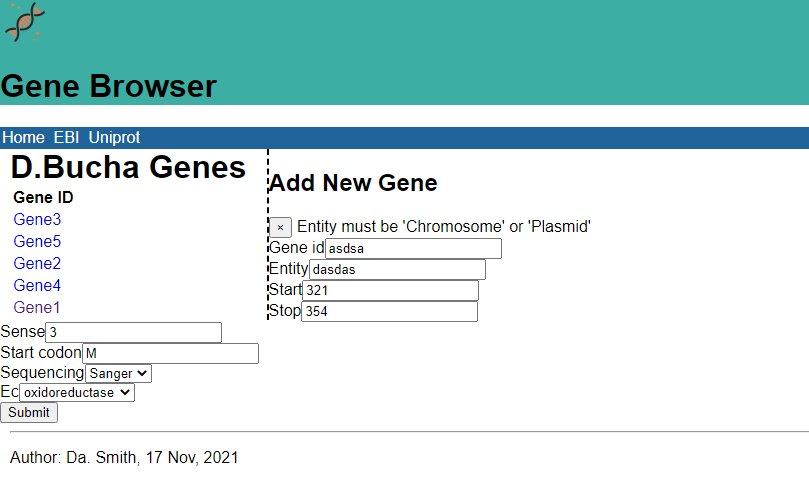32. Django validators
We’ve seen two ways of building Django forms:
- by declaring the variables independently
- by inheriting the variable types from our models
One important aspect of forms is the form validation. In views.py we used an is_valid() function – by default it checks the field types declared to ensure the data matches it.
If we want, we can write our own more sophisticated validations. For example, we know that entity can only be one of two values – either chromosome or plasmid. Likewise, sense can either be + or –
We can add some validation to our forms. We’re going to override the clean data function by adding this in our GeneForm class.
We need to do the basic check:
cleaned_data = super(GeneForm, self).clean()
And then check entity and sense against our own validations:
entity = cleaned_data.get("entity")
sense = cleaned_data.get("sense")
We then put in some if statements to check they are OK, and if they aren’t we can raise a validation error:
if not entity == "Chromosome" and not entity == "Plasmid":
raise forms.ValidationError("Entity must be 'Chromosome' or 'Plasmid'")
if not sense == "+" and not sense == "-":
raise forms.ValidationError("Sense must be '+' or '-'")
The complete function, and the whole class will be:
class GeneForm(ModelForm):
class Meta:
model = Gene
fields = ['gene_id', 'entity', 'start', 'stop', 'sense', 'start_codon', 'sequencing', 'ec']
def clean(self):
cleaned_data = super(GeneForm, self).clean()
entity = cleaned_data.get("entity")
sense = cleaned_data.get("sense")
if not entity == "Chromosome" and not entity == "Plasmid":
raise forms.ValidationError("Entity must be 'Chromosome' or 'Plasmid'")
if not sense == "+" and not sense == "-":
raise forms.ValidationError("Sense must be '+' or '-'")
return(cleaned_data)
Finally in views.py we need to show this validation error if necessary. We need to add an else statement to the if form.is_valid() test like this:
def create_gene(request):
master_genes = Gene.objects.all()
if request.method == 'POST':
form = GeneForm(request.POST)
if form.is_valid():
gene = form.save()
return HttpResponseRedirect('/create_gene/')
else:
return render(request, 'genedata/create_gene.html', {'error': "failed", 'master_genes': master_genes, 'form': form})
else:
form = GeneForm()
return render(request, 'genedata/create_gene.html', {'form': form, 'master_genes': master_genes})
To make this function work we needed to add master_genes to the top of the function, so the if else statements could find it.
Now if we try to put in false data, we will get an error accordingly based on our custom validation:
Wednesday 17 November 2021, 510 views
Next post: 33. Refactoring with generic views in Django Previous post: 31. Django forms (2) – using the ModelForm class
Advanced Web Development index
- 38. Writing API tests
- 37. Testing in Django
- 36. Class-based views in the Django REST framework
- 35. Building a RESTful web service in Django
- 34. Introduction to CRUD, REST and APIs
- 33. Refactoring with generic views in Django
- 32. Django validators
- 31. Django forms (2) – using the ModelForm class
- 30. Django forms (1)
- 29. JavaScript basics
- 28. Adding CSS to the template
- 27. Django templating
- 26. Deleting and updating records
- 25. Joins, filters and chaining commands
- 24. Using the ORM in views.py
- 23. Adding to the database by writing a script
- 22. Adding to the database with Django Admin
- 21. Migrations
- 20. ORM – work through example
- 19. An introduction to the Object-Relational Mapper
- 18. Altering the database
- 17. SQL functions and summaries
- 16. SQL Query performance
- 15. Queries and table joins in SQL
- 14. Inserts and queries in SQL
- 13. Good practice in relational database design
- 12. Limitations to database modelling
- 11. Building a database using SQL
- 10. Introduction to PostgreSQL
- 9. How to start writing a new application in Django
- 8. Building a lightweight project
- 7. Django URLs
- 6. Django templates
- 5. Django models
- 4. Django views
- 3. Creating a new hello app
- 2. Creating a new virtual environment
- 1. Setting up Django

Leave a Reply